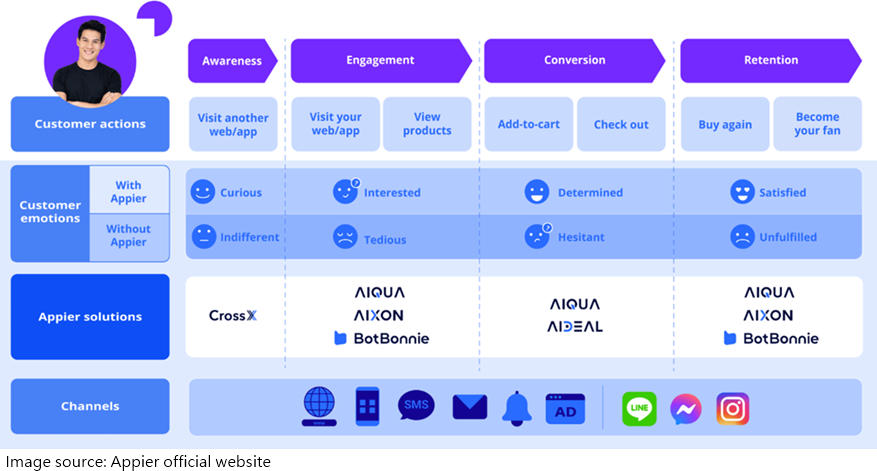With the development of digital technologies like big data, IoT, digital platforms, and AI, the age of Digital Empowerment has arrived. Collected data can be used to operate machines to replace human labor and optimize decision-making results, thus improving work efficiency and environments whilesatisfying the public’s daily consumption needs.
Moreover, with the recent COVID-19 pandemic as well as the rise of Metaverse and net-zero carbon emissions and sustainability concepts, the public consumer goods market is showing new demands for products and services that are unmanned, intelligent, low-carbon, automated, more resilient, and offer virtual-reality integrated multi-sensory experiences.
For instance, public and private sectors can collect large amounts of data via mobile devices, sensors, and network platforms, and then employ AI and other data analysis technologies to assist in operation decision-making issues; or enterprises can integrate IoT, AI, and AR/VR technologies to build a human-centric smart office and digital platform work environment.
Incorporating Digital Technologies To Provide Smart Seamless Consumption Experiences
Many Taiwanese companies are actively integrating AI, 3D simulations, AR/VR/MR, and many other technologies to offer customers a virtual-reality integrated shopping experience. Businesses can increase the efficiency of their logistics warehouse operations and supply chain integration as well as provide smarter, lower-carbon emission products by deploying AI, digital twins, human-robot collaboration, and bionic robot technologies.
SaaS (Software as a Service) company Appier is an example. Founded in 2012,the company leverages AI as its core technology to help enterprises make business decisions and ultimately achieve AI Democratization, Appier’s corporate vision. Its target clients are vertical application industries: e-commerce, retail, finance, insurance, gaming, and automobile. In addition to its Taiwan headquarters, Appier has 17 business locations in the Asia-Pacific region, Europe, and the United States.
One-Stop AI Technology Service That Predicts Consumption Intention
For the retail industry, Appier introduced a one-stop AI marketing service solution (as seen in photo 1) to help businesses respond to and take appropriate action during the four typical customer shopping stages (awareness, engagement, conversation, retention). The solution leverages AI technology to help e-commerce businesses and retailers combine online and offline data and create a personalized shopping experience for customers while increasing transaction success and satisfaction rates.
Photo 1. Appier’s one-stop AI marketing service solution
Technologies used in Appier’s one-stop marketing service solution include: (1) Cross-screen/device data tracking technology launches the timeliest customized ads based on the customer’s browsing behavior across multiple devices; (2) Customer consumption intention prediction technology uses detailed webpage browsing behaviors to generate a hesitation degree and purchase willingness model. The model then provides suitable limited-time offers at the best time to reduce the visitor’s hesitation time before placing orders and effectively boost transaction rates; (3) Natural language processing and collaborative filtering technology can automatically generate customer preference tags, thereby predict the customers’ potential future interests and create exclusive interactive marketing schemes to increase customer retention rate.
DiverseDeployment To Strengthen Core Competitiveness
Besides technology integration and enhancement, Appier is also bolstering its competitiveness through capital, mergers and acquisitions, talents, and patents. The companyraised more than USD 160 million through five rounds of fundraising between 2014 and 2019 and completed four M&As of AI startups(India’s AI marketing automation platform QGraph, Japan's real-time consumer behavior dynamic analysis company Emotion Intelligence, Taiwan's chatbot platform BotBonnie, the US’ consumer history analysis company Woopra) in the last five years to enhance product service capacity.
Furthermore, Appier is constantly looking for professional talent. As of April 2023, the company has nearly 700 employees, among which 70% have PhD or master's degrees in AI and/or big data-related fields. In addition to having patents related to AI, big data, machine learning, and marketing, Appier has published over 300 papers in leading academic journals and seminars and is a seven-time champion of the ACM KDD Cup, a global Data Mining and Knowledge Discovery competition.
ITRI:Ushering In The Virtual-Reality Integrated Consumption Era
Our daily consumption behaviors will become increasingly linked with digital technology as Web3 and Metaverse technologiesmature. For example, retailers can provide customers with new transaction options that protect personal data privacy with blockchain and cryptocurrency technologies; and the Metaverse offers a new marketing experience platform for retailers to provide shopping entertainment experiences that incorporate virtual-reality to their customers.
To meet the demands of the new consumption era, ITRI developed a new type of user data collection technology based on Web3/multiverse to assist manufacturers in reducing data acquisition costs by about 3% to 15% and improving customer analysis quality. Moreover, the Customer AI Tag Quick Generation Technology swiftly creates usable marketing tags during the customers’ consumption journey and can be used to gain insight into the customer’s preferences and launch precise marketing (e.g. predict whether the customer will use a coupon during a specific period? And should we issue coupons to the customer?)
Looking forward, consumption demand trends are gradually shifting towards virtual-reality multi-sensory experiences and being resilient and low-carbon. ITRI continues to integrate keytechnologies: 3D simulations, digital twins, AR/VR/MR, generative AI, smart bionic robots, and supply chain collaboration, to create virtual-reality integrated multi-sensory shopping experiences. The Institute will also carry out consumer demand and behavior analysis in multiverse scenarios and develop Web3 supply chain information digital trust solutions as well as application technologies such as low-carbon resource locating and tracking and cross-industry cross-region real-time dispatching to help domestic businesses cope with future challenges.


